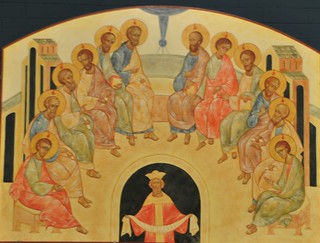
The Holy Spirit is Light and Life, a living Fountain of spiritual gifts, the Spirit of wisdom and understanding, all-knowing, upright and good: He leads us and washes away our sins. He is God, and He makes us gods; He is Fire proceeding from Fire, speaking and acting and distributing gifts. Through Him all the Prophets, Martyrs and Apostles of God are crowned. Strange account, strange and wonderful sight: fire is divided for distributing gifts. (Vespers hymn for the Day of the Holy Spirit)

The day after Pentecost is dedicated to the Holy Spirit. The Holy Spirit is one of the Persons of the Holy Trinity. The Holy Spirit is not some anonymous force or power in the world but is a Divine Person who is capable of hearing our prayers and bestowing blessings on us. Physicist John Polkinghorne explains:
When the tongues of fire descended at Pentecost, they are represented as being ‘distributed [diamerizomenai, divided] and resting on each of them‘ (Acts 2: 3). When Paul speaks of the gifts of the Spirit, he speaks of their variety among those to whom they are given (1 Corinthians 12:4-11). Here is an important clue to why we speak of the Spirit as a person, and not just an impersonal force or power. He deals individually with different people. . . .

Taylor sees the Spirit’s hidden presence as the ground of those experiences of disclosure in which we seem to penetrate beyond the surface into the heart of things, moments able ‘to turn and It into a Thou‘. The Spirit is, therefore, the unseen enabler of the truly personal, the hyphen in the I-Thou relationship. He who does not have his divine image within the Trinity, is at work creating that image through the transformation of humanity. In Lossky’s words about eschatological destiny: ‘It is then that this divine person, now unknown, not having His image in another Hypostasis, will manifest himself in deified persons: for the multitude of the saints will be his image’. That the Spirit is the agent of sanctification is one reason for the necessity of asserting his divinity, for only the fully divine can fully save and transform.

Another consequence of the Spirit’s divinity is that, however particularly and with due recognition he may be seen at work within the church, his action cannot be confined to its history alone. God is not the sole possession of any group. If, ‘When the Spirit of truth comes, he will guide you into all the truth’ (John 16:13), then we must surely understand this as implying his activity in the questing of all truth-seeking communities, including the spiritual explorations of other religious traditions and the physical exploration of the scientific tradition. (THE FAITH OF A PHYSICIST, pp 148-149)

